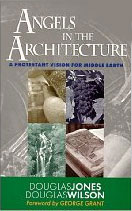Apr
8
2009
 Before Jesus ascended into heaven, He assigned an apparently overwhelming task to His disciples (Matt. 28:18-20). Like many familiar words, these often just float by us. We think we understand them simply because we are accustomed to them.
Before Jesus ascended into heaven, He assigned an apparently overwhelming task to His disciples (Matt. 28:18-20). Like many familiar words, these often just float by us. We think we understand them simply because we are accustomed to them.
But an understanding of this passage must always be at the centre of any thought of a distinctively Christian culture — not because our Lord’s words are primarily concerned with politics, but because they are not.Following the Lord’s authority, one of the distinctives of Christian cultural understanding is that it is also minimally concerned with politics. The restoration of the nations is not, in any important sense, a political process. Rather, the process is one of baptism and catechism. The means given for the conversion of the heathen were the waters of baptism and the words of instruction. When the lessons have been learned, there will of course be some political consequences. But they will be minimal for the simple reason that the state itself, in a nation that has come to repentance, will also be minimal. For the Christian, the political realm is a creature to be redeemed, sinful like the rest of us and with a long way to go before it retires to more biblical proportions.
- Douglas Jones, Douglas Wilson, Angels In The Architecture, p. 201-202
Comments Off | tags: Baptism, Doug Jones, Doug Wilson, Postmillennialism | posted in Quotes
Apr
8
2009
 “It is most remarkable that not only in Revelation do we find large patterns of evidences befitting the AD 60s era, but also even many smaller details. It it surely no accidental similarity that allows us to find not only particular personages (Nero), cultural structures (the Jewish Temple), and historical events (the Neronic persecution and the Jewish War) that harmonise well with the Neronic era, but even time-frames for these that fill out the picture of the era of which John wrote. It can be no other than in the mid- to late AD 60s.”
“It is most remarkable that not only in Revelation do we find large patterns of evidences befitting the AD 60s era, but also even many smaller details. It it surely no accidental similarity that allows us to find not only particular personages (Nero), cultural structures (the Jewish Temple), and historical events (the Neronic persecution and the Jewish War) that harmonise well with the Neronic era, but even time-frames for these that fill out the picture of the era of which John wrote. It can be no other than in the mid- to late AD 60s.”
Kenneth Gentry, Before Jerusalem Fell, p. 255-256
Comments Off | tags: Apocalyptic, Jewish war, Kenneth Gentry, Nero, Revelation, Temple | posted in Quotes, The Last Days
Apr
8
2009
“The principal part of faith is patience.”
- George Macdonald
Comments Off | tags: Faith | posted in Quotes
Apr
8
2009
If someone is reading God-honouring Christian books (as opposed to the theological Christian treacle which most Christian bookstores specialise in today), those books will admonish, advise, teach, and instruct. But above all, they will do what all godly teaching does — drive their readers back to the Scriptures. And that will result in more books.
- Doug Wilson, Mother Kirk, p.209.
Comments Off | tags: Doug Wilson | posted in Quotes
Apr
8
2009
An Examination of Both the Federal Vision and the New Perspective on Paul
http://www.biblelighthouse.com/covenants/within_the_bounds_of_orthodoxy.htm
by Joseph Minich – April, 2006
This essay is neither a defense nor a sustained critique of either the Federal Vision or the New Perspective on Paul. The exclusive aim of this presentation is to ask the question, “Can advocates of either of these positions be considered as within the bounds of Reformation orthodoxy?” That is, whether or not one agrees with one or the other of these movements, or whether or not one agrees with how they word certain things, can they nevertheless be interpreted in such a way as to be within the broad parameters of the Reformed faith?
Continue reading
3 comments | tags: James Jordan, Orthodoxy, Postmillennialism | posted in Biblical Theology
Apr
8
2009
There is a lot of truth in theonomy. But things have changed since the time of Moses. At that point, the church and state were basically one.
After the exile, things were different. The role of the Jews was to be priests within the Gentile state. They no longer had the right to administer capital punishment. When they witnessed faithfully, there was a Jew at the emperor’s right hand, steering the empire for God’s people and their stand for the truth.
Continue reading
Comments Off | tags: Abel, AD70, Daniel, Haman, Joseph, Mordecai, Theonomy, Witness | posted in Biblical Theology, Ethics
Apr
8
2009

James Jordan points out that when the Lord confused the languages of the Babel builders, the Hebrew term is ‘lip’, and it carries the connotation of scattering their religious profession.
Continue reading
Comments Off | tags: Babel, James Jordan, Power of the Gospel, Tongues | posted in Biblical Theology, Ethics
Apr
8
2009
“The failure to understand the Babelic context of Israel’s history results in a failure to understand the purpose of tongues in the New Testament, and a failure to understand the historical transition that took place between A.D. 30 and 70. God judged Babel because if the people were united, nothing would be withheld from them (Gen. 11). Jesus prays that His people would be united, so that nothing will be withheld from us (John 17). It was necessary for Jewish and Gentile believers to overcome the Old Covenant bipolarity and be united, before the Gospel could really go forth in full power. After A.D. 70, with Jew and Gentile united in one Church, nothing can be withheld from us, unless we choose by our sin to be disunited. After A.D. 70, there is no longer any God-instituted historical disunity in operation.”
- James B. Jordan, The future of Israel re-examined
http://www.bullartistry.com.au/lastdays.html (articles 13-15)
Comments Off | tags: Babel, James Jordan, Tongues | posted in Biblical Theology, The Last Days
Apr
8
2009

“God told Noah to build the Ark with nests inside. The word qen {kane} is translated nests every other time it appears in Scripture, but most versions substitute the word rooms only for Noah’s Ark. Since there is no good reason to do this, we should take nests as the preferred option. Thinking in terms of nests rather than rooms, we begin to see a different view of how the animals may have been housed…
As nests, it would be inappropriate to imagine animals lined up on display or herded together in huge stalls. Neither option would suit animal transport anyway. Instead, we should be thinking of snug, private enclosures where an animal would hide and bed down. The enclosure should be comfortable, safe, private, warm and probably darkened. It should also be an area that is not routinely disturbed.”
from www.worldwideflood.com
If the ark prefigured the Temple and the body of Christ, a floating “house” mediating between the old world and the new, the congregations within His body are “nests.”
Comments Off | tags: Noah, The flood | posted in Biblical Theology, Creation
Apr
8
2009
Atheists reduce Religion/Theology to a chapter within anthropology. This, of course, removes any claim to validity for Christianity. It just gets lumped together with other ‘superstitions.’
In response, theologian Wolfhart Pannenberg claims that the Godness of God and not human religious experience must have first place in theology. (Quoted in Michael Jensen’s post Pannenberg on Anthropology at mpjensen.blogspot.com)
 ‘Theologians will be able to defend the truth precisely of their talk about God only if they first respond to the atheistic critique of religion on the terrain of anthropology. Otherwise all their assertions, however impressive, about the primacy of the Godness of God will remain purely subjective assurances without any serious claim to universal validity.’1
‘Theologians will be able to defend the truth precisely of their talk about God only if they first respond to the atheistic critique of religion on the terrain of anthropology. Otherwise all their assertions, however impressive, about the primacy of the Godness of God will remain purely subjective assurances without any serious claim to universal validity.’1
Jensen summarises, ‘He maintains, furthermore, that rejecting this anthropological ground is in fact conceding the ground to anthropological suppositions – by reducing theology to mere subjectivity.’
So, I think Pannenberg says:
1 Anthropology is actually a chapter within theology, not the other way around.
2 Christians must debate the issue on anthropological grounds, or there is no common ground upon which to engage the atheists in debate. In other words, they have won the boxing match by default because we won’t enter the boxing ring.
Jensen asks, ‘Which way are evangelicals going to swing on this?’
To mix metaphors, don’t swing in a boxing ring that doesn’t exist! The foundation of the atheists’ anthropology is fiction.
Continue reading
Comments Off | tags: Anthropology, Michael Jensen | posted in Apologetics, Creation
Before Jesus ascended into heaven, He assigned an apparently overwhelming task to His disciples (Matt. 28:18-20). Like many familiar words, these often just float by us. We think we understand them simply because we are accustomed to them.





























